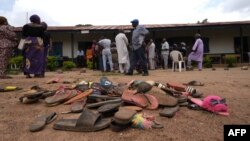The new school year started in Nigeria this month, but more than 600 schools are still closed because of a surge in kidnappings and attacks by armed gangs, according to authorities.
In the small town of Sabo, south of Kaduna state, a group of schoolchildren are united by a common enemy: armed conflict. Most of the children arrived at this temporary shelter with their parents last November, after their villages were overrun by armed gangs.
One resident, Abayo Iliya, said it was the last time his 6-year-old son attended school.
Iliya said his village was attacked, and their homes, farms and the school were burned. Iliya's son's school has since been closed.
Iliya's wife, Alheri, said they would like to enroll their son in a safer school but cannot afford it. They lost everything, she said, so they don't have the money to go to another school.
This month, the U.N. Educational, Scientific and Cultural Organization, better known as UNESCO, reported that more than 20 million Nigerian children are out of school, up nearly 2 million compared with a similar survey announced by UNICEF in May.
But Nigerian authorities dispute the figures, saying the situation has improved and that the government has been spending much more on education.
Authorities also say UNESCO's estimates did not capture the number of children attending unconventional schools in northern Nigeria.
But Abdulsalami Ladigbolu, the head of UNESCO's Read and Earn Federation in Nigeria, said many factors that contribute to the problem were considered before publishing the report.
"It's a complex situation. Really, insurgency can be part of it. Secondly, the death of their parents or guardian responsible for tuition. Another factor we can consider is early marriage," Ladigbolu said, adding that that issue is specific to girls.
Last week, dozens of worshippers were kidnapped in Kajuru, and their abductors are demanding more than $450,000 as ransom.
Nigerian authorities have been intensifying crackdowns on armed gangs and say there has been some success, including a recent airstrike that killed about 200 suspected bandits in the north.
But until insecurity is addressed, the threat will remain and people like Iliya will have a hard time educating their children.




